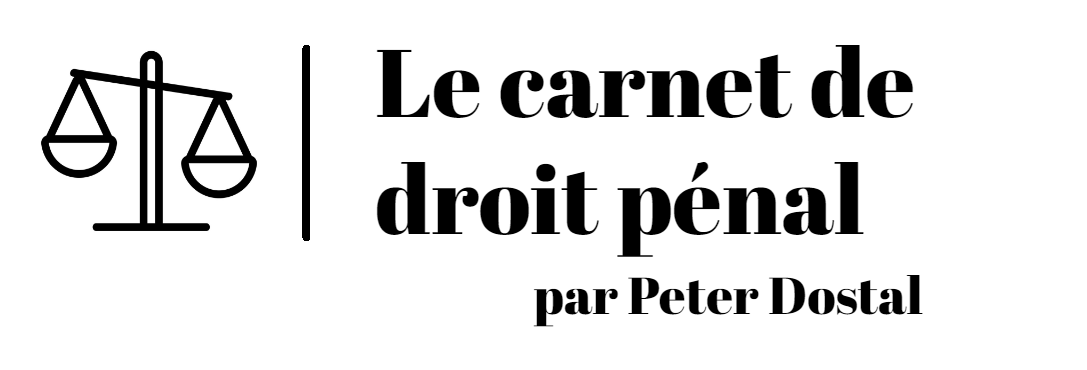« Abandon d’un enfant (infraction) » : différence entre les versions
Aucun résumé des modifications |
|||
| Ligne 98 : | Ligne 98 : | ||
; Actus Reus | ; Actus Reus | ||
Un enfant de 14 mois laissé dans un véhicule pendant 3 heures par des températures négatives de 14 degrés constituerait l'infraction.<ref> | |||
{{CanLIIRP|Holzer|2bc9h|1988 CanLII 3795 (AB QB)|63 CR (3d) 301}}{{perABQB|MacCallum J}} | {{CanLIIRP|Holzer|2bc9h|1988 CanLII 3795 (AB QB)|63 CR (3d) 301}}{{perABQB|MacCallum J}} | ||
</ | </réf> | ||
; | ; Réa pour hommes | ||
L'infraction nécessite une faute subjective.<ref> | |||
{{CanLIIRP|ADH|fxgf4|2013 SCC 28 (CanLII)|[2013] 2 SCR 269}}{{perSCC|Cromwell J}}{{atL|fxgf4|75}}</ref> | {{CanLIIRP|ADH|fxgf4|2013 SCC 28 (CanLII)|[2013] 2 SCR 269}}{{perSCC|Cromwell J}}{{atL|fxgf4|75}}</ref> | ||
The offence criminalizes risk and so may require knowledge of that risk.<ref> | The offence criminalizes risk and so may require knowledge of that risk.<ref> | ||
{{ibid1|ADH}}{{atL|fxgf4|53}}</ref> | {{ibid1|ADH}}{{atL|fxgf4|53}}</ref> | ||
; | ; Âge de la victime | ||
L'article 30 de la Loi d'interprétation détermine l'âge pour cet article.<ref> | |||
See [http://canlii.ca/t/7vhg#sec30 s. 30 of the IA]: "A person is deemed not to have attained a specified number of years of age until the commencement of the anniversary, of the same number, of the day of that person’s birth." | See [http://canlii.ca/t/7vhg#sec30 s. 30 of the IA]: "A person is deemed not to have attained a specified number of years of age until the commencement of the anniversary, of the same number, of the day of that person’s birth." | ||
</ref> | </ref> | ||
Le terme « enfant » n'est pas défini dans le Code.<ref> Voir l'art. 214 qui avait la définition jusqu'à son abrogation en 2002</ref> | |||
L'article 658 fournit des méthodes de preuve.<ref> | |||
Voir [[Compétence des tribunaux#Jeunes personnes]] | |||
</ | </réf> | ||
; | ; Preuve du conjoint | ||
L'article 4(3) de la Loi sur la preuve supprime [[Compétence et contraignabilité|incompétence du conjoint]]. | |||
; | ; Mise en danger | ||
La Couronne doit prouver plus que le « potentiel » de mise en danger. Il doit s'agir d'une véritable mise en danger.<ref> | |||
{{CanLIIRP|Freitas|1qwld|1999 CanLII 14071 (MB CA)|132 CCC (3d) 333}}{{perMBCA|Twaddle JA}}<br> | {{CanLIIRP|Freitas|1qwld|1999 CanLII 14071 (MB CA)|132 CCC (3d) 333}}{{perMBCA|Twaddle JA}}<br> | ||
{{CanLIIR-N|JR|, [2000] OJ No 6073 (OntHCJ)}}<br> | {{CanLIIR-N|JR|, [2000] OJ No 6073 (OntHCJ)}}<br> | ||
| Ligne 131 : | Ligne 131 : | ||
{{quotation2| | {{quotation2| | ||
; | ;PARTIE VIII | ||
214 | ;Infractions contre la personne et la réputation | ||
;Définitions | |||
'''" | ;Définitions | ||
: | 214 Les définitions qui suivent s’appliquent à la présente partie {{AnnSec|Part VIII}}. | ||
:( | '''"abandonner"''' ou '''"exposer"''' S’entend notamment : | ||
:a) de l’omission volontaire, par une personne légalement tenue de le faire, de prendre soin d’un enfant; | |||
:b) du fait de traiter un enfant d’une façon pouvant l’exposer à des dangers contre lesquels il n’est pas protégé. (abandon or expose) | |||
{{ellipsis}} | {{ellipsis}} | ||
R. | L.R. (1985), ch. C-46, art. 214; | ||
R. | L.R. (1985), ch. 27 (1er suppl.), art. 33, ch. 32 (4e suppl.), art. 56; | ||
2002, ch. 13, art. 9; | |||
2018, ch. 21, art. 13. | |||
{{annotation}} | {{annotation}} | ||
|{{CCCSec2|214}} | |{{CCCSec2|214}} | ||
| Ligne 147 : | Ligne 149 : | ||
}} | }} | ||
« Abandonner », c'est « laisser [l'enfant] à son sort ».<ref> | |||
{{CanLIIRP|Reedy|gbnfc|1981 CanLII 3130|58 CCC (2d) 571}}{{perONCJ|Boyd J}} | {{CanLIIRP|Reedy|gbnfc|1981 CanLII 3130|58 CCC (2d) 571}}{{perONCJ|Boyd J}} | ||
</ | </réf> | ||
Le simple fait de confier un enfant à une personne chargée de s'en occuper ne constitue pas un abandon. Il doit y avoir « une omission délibérée de prendre en charge l'enfant, ou une manière de le gérer destinée à le laisser sans soins appropriés ».<ref> | |||
{{CanLIIR-N|Davis| (1909), 18 O.L.R. 387}} | {{CanLIIR-N|Davis| (1909), 18 O.L.R. 387}} cité par Reedy et {{CanLIIRP|Bokane-Haraszt|1rk4q|2007 ONCJ 228 (CanLII)|OJ No 2000}}{{perONCJ|Bourque J}} | ||
</ | </réf> | ||
Le fait de renoncer à tout droit sur un enfant ne sera pas non plus un abandon.<ref> | |||
{{ibid1|Davis}}</ref> | {{ibid1|Davis}}</ref> | ||
